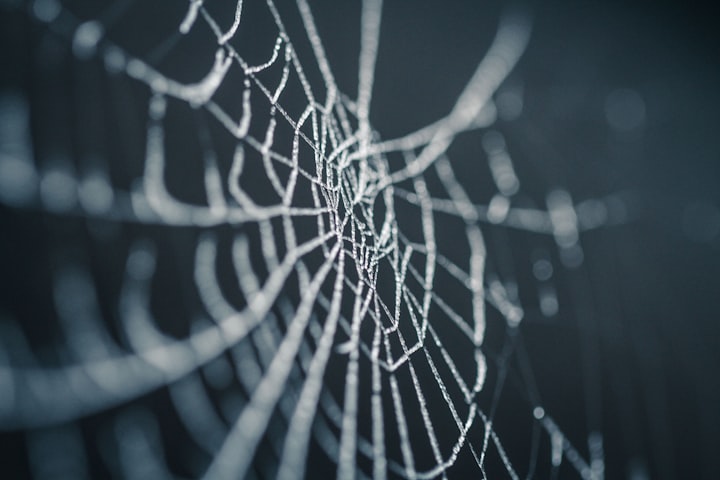
Keep your head down and don't make a sound.
There are eyes and ears everywhere. Eyes from the indestructible security cameras swiveling upon whitewashed walls, ears from the tiny microphones embedded in every slave collar clasped around our bare throats. There is no such thing as privacy anymore, not since the incident of 2095—Callagan's Rebellion, led by Reese Callagan, an immoral anarchist who set the White House aflame, opened fire in the Senate, and threw the whole country into chaos.
Needless to say, the consequences for that particular brand of violence were far more severe than even the Capitol riots of 2021. Hordes of people were rounded up and shoved into newly-built facilities designed to test new ways to mass-control the populace. Men, women, children, elderly, disabled, homeless—that didn't matter to them. At least not in the beginning, not until they realized that children produced the best results long-term due to their youthful resilience.
I was taken when I was just ten years old. Torn from the arms of my screaming mother, I watched in terror from over the shoulder of a big, beefy man who'd slung me over it like a sack of potatoes as my father attempted to get me back and was gunned down where he stood. I remember the cloying smell of blood, the way it soaked into the earth and turned it red, the darkness and griminess of the trailer I was unceremoniously shoved into with several other crying children, the despair and shock and hopelessness that nearly crushed me when that damn collar was first latched around my neck.
It's been eight years since then.
I keep my eyes lowered as I shuffle along with the other prisoners to Testing Room C, where they are administering a new experimental drug. Lucky us, we get to be the first guinea pigs. Oh, the scientists in charge of the project go on and on forever about how we aren't slaves, that we should be grateful to be given the honor of doing our part for the glory of the United States of America, but I know better. We're nothing but animals in their eyes.
But if you do as you’re told, then nobody has to die.
When I reach the injection station, I hold out my right wrist without being told. There, tattooed in black ink, is my designation: FU25-203. Female Under 25, #203. That's all I am to them—a number, a barcode, another body to dispose of when mine inevitably gives out.
The woman at the station scans the barcode on my wrist and gestures to the table next to her. “Lay down,” she instructs, snapping on a pair of white latex gloves. I climb on to the sterile table and lay on my back quietly. When I was younger, I’d kick and scream and do everything I could to reject the procedure, because the idea of getting foreign substances injected into my body horrified me beyond measure.
Now, I know it’s easier to just do as I’m told. The more cooperative you are, the sooner you can leave. Acting out only brings you more pain, and possibly death.
As the woman prepares the syringe, I turn my head to the side to observe her as briefly as I can. Her dark hair is neatly pulled into a bun behind her head, a few short strands falling just above her eyes. There are faint lines around her eyes and mouth that speak of stress and long shifts with very little time to sleep in between. She’s wearing the same white lab coat as all the other scientists, but hers is worn loose and unbuttoned, proudly displaying the silver heart-shaped locket laying against her diaphragm.
I wonder if she’s married, or has any children of her own.
When she turns towards me to administer the drug, I quickly pretend that I was staring at the ceiling all along, even though it is as bland and white as everything else in this facility.
The prick of the needle entering my arm is as unpleasant as ever, but the injection goes by relatively quickly. The woman slaps a small bandaid on my arm and tells me to head to the Observation Room, where I will be subjected to even more tests.
I bite down on the sigh that threatens to leave my throat, and then I sit up.
The Observation Room is exactly as the name says—a room for the scientists to poke and prod us to observe whether there are any adverse reactions to whatever drug we’d been dosed with. I’ve been pretty lucky so far, if I do say so myself. The worst reaction I had to a drug was a fever that had lasted three whole days and left me weak and sore at the end. I’ve seen others fall down screaming while clutching their faces, or hemorrhage blood from their nose and ears. A few times, someone would go to a corner, curl up in fetal position, and stare blankly into space while they chew their own fingernails down to the bed. One man had even attempted to simulate flight while jumping off a chair, and promptly broke both of his legs.
Today when I step into the room, I am almost immediately besieged by a boy gnashing his teeth together and foaming bloody saliva at the mouth. I gasp and frantically dodge to the side to avoid his clumsy attempt to grab me by the shoulders. The chief scientist is shouting angrily at his subordinates, who all hurry to restrain the boy before he can cause any damage to the other patients. One of the observing scientists gently takes me by the wrist and leads me over to the vacant station in the far corner of the room. I watch as my fellow patients turn away from the spectacle and try their hardest to ignore it. I, too, force myself to keep my head down and my eyes on the back of the scientist’s two-inch heels clicking rhythmically along the white tile floor.
She scans my barcode at the station. “How are you feeling now, Number 203?” she asks, smiling in faux politeness. The laboratory ID strung on a green lanyard around her neck says that she is Dr. Bianca, vice-chief of the Observation Room. Her voice is sweet and mellow, like honey. Neat curls of chestnut hair fall around her shoulders, and her face appears to be relaxed and open as if projecting the image of a warm, welcoming individual.
I’ve been here too long to fall for any of those illusionary tricks. “I am well, doctor,” I say. “I am not feeling any effects yet.”
Dr. Bianca nods along with me, typing a few notes into her computer. “Have you experienced any negative side effects from drug trials in the past?”
“Mainly a fever when I took the, um—” I frown as I wrack my brain for the name of the drug that laid me up in bed for three days straight, “—the Moonfish Compound, I think it was called? Other than that, I haven’t had more than some occasional chills and muscle soreness.”
“Wonderful, that means your immune system is functioning quite well.” Dr. Bianca directs my attention to the bare wall, where she projects an image with various shapes on it. “Now tell me what you see.”
I name a square, a circle, a triangle, and a hexagon before I start to feel a strange prickling feeling at the base of my spine. It doesn’t exactly hurt, per se—it just feels like something fuzzy is wriggling around near my butt and it’s an extremely odd feeling. I definitely don’t like it, but I try my best to ignore it and continue on with the extended testing.
Dr. Bianca draws up a screen full of words after the shapes and makes me read them out loud, then she switches to a picture of the ruins of a city and asks me to describe it. I get halfway through the description before I feel a tremendous explosion of pain across my back, like my spine is being twisted in two, and I topple over with a short scream. She doesn’t try to catch me.
The smile that had been on her face up till now fades into a scowl. Dr. Bianca switches off the projection and leans over her desk to watch me writhe on the floor, digging my fingernails into my arms as the sensation of spiders crawling over my skin intensifies. “Pity, I thought you would have lasted longer,” she murmurs, throwing herself back into her chair and typing her new observation into the computer.
This pain is by far the worst I have ever felt. Not only does my spine feel like it's twisting in on itself, but my bones feel brittle where they rub against each other as I roll around on the tiled floor, gasping for breath. Oh god, it hurts! I slap one hand against the floor and cry out in agony when it feels like all my fingers shatter in that single blow.
When I try to make eye contact with any of the other patients, to plead for mercy, I find no solace. Their backs have now been turned to me, too.
So then I cling desperately to the memories of my family and happier times amidst the tidal waves of pain that travel through my whole body like there are a thousand needles piercing me over and over again. I think of warm sunlight and beaches and fresh air, of my mother’s colorful bohemian skirts swishing in the wind and my father wearing a set of bright orange fishing waders as he takes his rowboat out for the day, of the small yellow house on the hill overlooking the sea where I was born. As the darkness creeps in around the edges of my thoughts, I think of a somber little girl holding out her hand on my first day at the facility and introducing herself as Giselle rather than FU25-166, and my grief and sorrow when she was overdosed on a drug three weeks in and turned into a vegetable.
They may take my mind, they may take my body, and they may take my freedom and control away from me.
But I won’t let them take my humanity, too.
About the Creator
Netti
A hobby writer and aspiring novelist with a far too active imagination that she wishes to share.






Comments
There are no comments for this story
Be the first to respond and start the conversation.